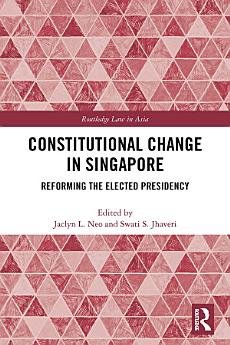Constitutional Change in Singapore: Reforming the Elected Presidency
Jaclyn Neo · Swati Jhaveri
Dec 2019 · Routledge
Ebook
298
Pages
family_home
Eligible
info
reportRatings and reviews aren’t verified Learn More
About this ebook
Once a ceremonial position modelled after the constitutional monarchy in the United Kingdom, the office of the President of Singapore was transformed from an appointed to an elected one in 1991. As the head of state, but not the head of government, the elected President was to have additional discretionary powers involving the spending of financial reserves, appointment of high-ranking public servants, and certain ministerial powers to detain without trial. In 2016, a constitutional commission was convened to consider further reforms to the office and the elections process. This book explores Singapore’s presidency, assessing how well it has functioned, discussing the rationales for an elected presidency, and evaluating the constitutional commission’s recommendations for reforms, including the need for minority representation in the office. In doing so, the book provides important reflections on how the constitutional reform process raises crucial questions about the rule of law and the practice of constitutionalism in Singapore.
About the author
Jaclyn L. Neo is an Associate Professor in the Faculty of Law at the National University of Singapore
Swati S. Jhaveri is an Assistant Professor in the Faculty of Law at the National University of Singapore
Rate this ebook
Tell us what you think.
Reading information
Smartphones and tablets
Install the Google Play Books app for Android and iPad/iPhone. It syncs automatically with your account and allows you to read online or offline wherever you are.
Laptops and computers
You can listen to audiobooks purchased on Google Play using your computer's web browser.
eReaders and other devices
To read on e-ink devices like Kobo eReaders, you'll need to download a file and transfer it to your device. Follow the detailed Help Center instructions to transfer the files to supported eReaders.





